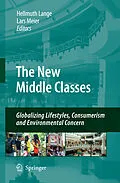The new middle classes of developing countries are held responsible for boosting extremely resource-intensive lifestyles beyond the OECD-world thus thwarting ongoing efforts to attain a more sustainable future. But how homogeneous are their consumption patterns and why should not globalization include the extension of environmental concern, too?
"The New Middle Classes" challenges a narrow understanding of lifestyles and consumption by analyzing the issue not only in terms of attitudes and preferences but of socio-economic features and governmental policies, too.
Original contributions from internationally renowned researchers bring fresh multidisciplinary insights in both theoretical and empirical respect.
"The New Middle Classes" will be of interest mainly to sociologists, political scientists, human geographers, and anthropologists.
Zusammenfassung
With respect to the developing and threshold economies, it is no longer the poor who are the only focus of media attention. Today, the new middle classes are about to take centre stage, too. With their lifestyles and attitudes, the new middle classes are considered to be both the products as well as the promoters of globalization. They are a highly heterogeneousgroup in socio-economicterms as well as in habits 1 and preferences, including their societal role as consumers and citizens. The ?rst wave of scholarly and political attention can be traced back to the mid-nineties. The focal point was surprise and unease about indubitable symptoms of consumerism which, until then had been seen as a characteristic of the richest western societies. However, since the nineties, consumerism has run rampant in - velopingcountriestoo.Thishasparticularlybeennotedwithrespecttotheemerging middle classes in South East Asia. The will to consume seemed inexhaustible, and appetites insatiable. This rage to consume [...] was both celebrated and feared by political leadersand other social/moralgatekeepers,who beganto condemnthe p- cess as 'Westernization' and even 'westoxi?cation' (Chua 2000: xii). Ever since, the debate about the lifestyles of the new middle classes and their role in society has gained momentum.
Inhalt
Modernities, Globalization and Consumption.- Who are the New Middle Classes and why are they Given so Much Public Attention?.- Convergence and Divergence in Societal Modernization: Global trends, Regional Variations, and Some Implications for Sustainability.- Consumerist Lifestyles in the Context of Globalization: Investigating Scenarios of Homogenization, Diversification and Hybridization.- Who are the Globalizers? The Role of Education and Educational Elites.- Provider Strategies and the Greening of Consumption Practices: Exploring the Role of Companies in Sustainable Consumption.- From Small Objects to Cars: Consumption Expansion in East Asia.- New Middle Classes in China, Brazil, Ecuador and Israel.- Rising Capitalism, Emerging Middle-Classes and Environmental Perspectives in China: A Weberian Approach.- Globalization of Lifestyle: Golfing in China.- Who are the Knowledge Workers of Campinas, SP, Brazil and how do they Live? Local Impacts of Global Trends.- Sustainability of a Life Más Cómodo? Agricultural Change, Remaking Families, and the Emerging Indigenous Middle Class in the Ecuadorian Andes.- New Middle Class and Environmental Lifestyle in Israel.- New Middle Classes in India.- The Political Economy of Lifestyle: Consumption, India's New Middle Class and State-Led Development.- Environmentality in the Neoliberal City: Attitudes, Governance and Social Justice.- India's 'New Middle Class' and the Globalising City: Software Professionals in Bangalore, India.- The Changing Food Scenario and the Middle Classes in the Emerging Megacity of Hyderabad, India.- Highly Qualified Employees in Bangalore, India: Consumerist Predators?.
